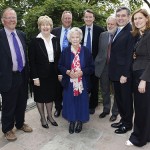The History of The Open University Project is hosting a workshop that, through the prism of The Open University’s development, aims to reflect on debates about learning and teaching, the rationales for and values of higher education and the impact of expanding higher education on British society as whole.
Opening Up The Open University will be held on Wednesday 3 November, 11:00, Seminar rooms 1 and 2, Library and Learning Resources Centre, Walton Hall. For more information see here.
Proposals are invited for individual papers addressing themes related to the University’s development from a wide range of fields including the political, economic, social, cultural and technological.
Possible subjects for papers include:
– What has been taught; how have content and disciplinary boundaries altered and what influence have such changes had in the outside world?
– How have pedagogic techniques and tools evolved within the University and outside it?
– To what extent has the University succeeded in widening participation; and what impact have its efforts to widen participation had on British society and further afield?
– How successful have course teams been as a method of constructing high quality distance teaching?
– What have been the implications of collaboration with the BBC?
– How has the University’s different status affected its development?
– What has been the effect on the University’s development of being a four-nation university?
– What can we learn from representations of the University be they fictional or derived from personal experiences?
– How has the University’s international strategy changed over 40 years?
– What influence have Tutors, Tutor-Counsellors and Associate Lecturers had on development?
Abstracts of 150-250 words should be emailed to [email protected] by 9 July. Papers will be selected from those submitted.
We would like to create a network of people interested in these questions. If you would like to be part of that network please let us know. For more information email [email protected]
